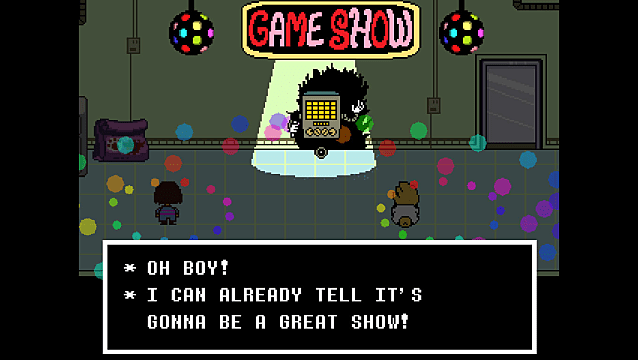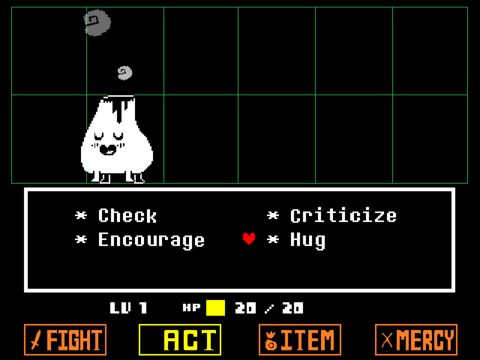Last month, however, a retro-looking game I had never heard of passed me by. A blogger I like got excited by skeletons named after the fonts they spoke in. One of my friends rushed into a battle he shouldn’t have fought. Another friend, whom by all accounts was having a very bad time, seemed inconsolable. Yet more of my social circle bought in, until the pull of the game seemed inexorable; even if it did seem like just another flavor-of-the-month indie.
I came into Undertale knowing just enough: knowing that the tagline of the game, you don’t have to destroy anyone, meant that harming anything would lock me out of the game’s best ending, knowing that my save file wasn’t necessarily under my control, knowing that the game would know, even between playthroughs. I was lucky enough to be around people who refused to divulge more than that, leaving me to discover the game’s pleasures all on my own.
Undertale is a sum of small experiences. With no achievements to strive for, no checklists of collectibles, and no sense of particular urgency for the majority of the game, I was left to explore at my own pace. I played golf in the snow, balanced hotdogs, listened to music, pet several dogs and laughed at some annoying ones, accidentally set a snail on fire, and loudly insisted to all who listened that anime is real, you guys. Without scores or statistics, my focus shifted to enjoying the game’s simplistic look and ever-present charm.
The underlying horror of the game’s setting and backstory at times seemed far away. At others, it crowded in close, and both the quality and the heart of the game’s writing and innovation shone through. Undertale uses it limitations brilliantly, producing moments of shocking subversion that reminded me sharply that this wasn’t something emulated from decades past.
Determination becomes more than a buzzword – it’s a major theme of the game. Excess or senseless determination sees the player making terrible, irreversible decisions for the sake of completionism. At every turn, Undertale simultaneously asks you to give up your pursuit of its worst ending, and mocks you for doing things halfway. It deftly navigates a fine line between intriguing and heavy-handed.
Perhaps most of all, Undertale is unafraid to be a good game about fundamentally good people…mostly. The game’s best ending is a bittersweet triumph that brings together many loose ends – but not all. Fractures between some characters are too deep to heal, and it is ultimately impossible to save everybody, not even through the much-vaunted use of determination.
There’s a complexity to these characters and their situations that showcases the talent of the game’s developer, Toby Fox. Not everything’s perfect or so neatly resolved in life, but there’s still enormous potential for goodness and love to enrich it. Undertale reflects this richness beautifully.
In my Undertale, everybody lived happily ever after – or as happily as they could. The game did all it could to ask me to leave things at that, and the fact that I have is a reflection of this little indie title’s potential to be Game of the Year.


